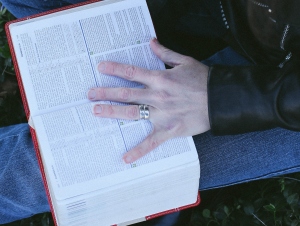Two Nazarites walked into a juice bar. (It was a juice bar because, being Nazarites, they don’t drink alcohol.) Both were the long-desired offspring of barren couples, both dedicated entirely to God before they were born, and both destined to die at the hands of oppressors (though the reasons for their death were very different).
They are the only two Nazarites most of us could name, one from the Old Testament and one from the New: Samson and John the Baptist. (You get extra credit if you know that Samuel was also a Nazarite. See 1 Samuel 1:11. I didn’t know it until I read the study notes in my Bible today.) Let’s stand these two side by side and see what we can learn.
Birth: Barrenness, Angels, and Life-Long Dedication
Both men were set apart for
God from before conception.
Manoah’s wife (we don’t get her name) was barren when “the angel of the Lord appeared to her and said, ‘You are barren and childless, but you are going to become pregnant and give birth to a son’” (Judges 13:3). Zechariah’s wife, Elizabeth, was also barren when an angel appeared to Zechariah in the temple and said, “Your wife Elizabeth will bear you a son, and you are to call him John” (Luke 1:13). On both occasions, the angel went on to explain that the boy would be set apart for service to the Lord. In Samson’s case, it was explicitly as a Nazarite (Judges 13:5). In John’s case, we infer from the text, which says he would never drink alcohol and he would be “filled with the Holy Spirit even before he is born” (Luke 1:15).
Not clear on what a Nazarite is? Check Numbers 6 and/or skip down to the first comment below, where I’ve summarized it.
Life: Wilderness, Honey, and Owning One’s Identity
Both Samson and John the Baptist grew up to be “the outdoorsy type.” After killing a lion, Samson knew how to find the exact spot later (Judges 14:5-9). He was also able to catch 300 wild foxes—no easy task (Judges 15:3-5). John lived in the wilderness when “the word of God came to him” (Luke 3:2), and he stayed there to do his preaching (Matthew 3:1, 5). Both men liked wild honey, but only Samson took his from a dead animal (Judges 14:8-9, Matthew 3:4).
From the beginning, Samson disregarded his Nazarite identity. While he enjoyed supernatural strength from God (despite his bad behavior), he never guarded his vows and frequently touched dead things (e.g. Judges 14:6, 19; 15:14-15; 16:3). Judges doesn’t say, but I bet he drank alcohol at some of those parties, too. Throughout his life, Samson never pointed people to God. John, on the other hand, embraced his Nazarite identity. The gospels aren’t explicit, but one gets the impression that John’s wilderness roamings, his hermit-like tendencies, and even his camel hair clothes (Matthew 3:4), reflected his effort to uphold the vows he never asked to take. John’s whole adult life centered on pointing people to Jesus (John 1:26-34).
Death: Oppressors, Lust, and Leaving a Legacy
Both men died
because of lust.
Lust led to the death of both Samson and John, and both died at the hands of oppressors. But they left very different legacies.
Samson’s desire for Delilah—a woman to whom he wasn’t married—clouded his judgement. After much nagging (Yes, the Scriptures use that word!), he told her the secret of his strength. She shaved his head, and the Philistines captured him, plucking out his eyes before they put him to work in prison (Judges 16:4-21). At a big party, the Philistines put the blind, weak Samson on display. The Bible says, “He performed for them” (Judges 16:25). How humiliating! But Samson saw his opportunity. He prayed,
Sovereign Lord, remember me. Please, God, strengthen me just once more, and let me with one blow get revenge on the Philistines for my two eyes. –Judges 16:28
Even here, weakened and humiliated, Samson didn’t honor God with his request. Instead, he sought revenge, even though it meant his own death. Samson’s lust led to his death.
Herodias hated John for telling the truth about her marriage to Herod. She talked Herod into arresting John and putting him in prison (Mark 6:17-20). On Herod’s birthday, he threw himself a big party. Salome, Herodias’ daughter, danced for her step-father and his guests. Matthew explains:
On Herod’s birthday the daughter of Herodias danced for the guests and pleased Herod so much that he promised with an oath to give her whatever she asked. Prompted by her mother, she said, “Give me here on a platter the head of John the Baptist.” The king was distressed, but because of his oaths and his dinner guests, he ordered that her request be granted and had John beheaded in the prison. –Matthew 14:6-10
His judgment was clouded by lust (for his wife’s daughter!!) and probably alcohol, but Herod had to fulfill his oath. John died because of Herod’s lust.
Samson lived a reckless
life solely for himself.
John lived a weird life,
but he focused on Jesus.
Samson lived a reckless, sinful life, taking advantage of God’s gifts and grabbing as much attention as he could for himself. Yes, God used Samson to destroy Israel’s enemies, but He could have been so much more, had he gotten beyond himself—his pain, his resentment, his selfishness—to focus his life on God’s glory. Instead, he remained vengeful and proud, and he died in that vengeance.
John lived an unusual (to our eyes), single-minded life pointing others to Jesus. “Look,” John said, “the Lamb of God, who takes away the sin of the world!” (John 1:29). He died for speaking Truth to power.

We’re all born into situations for which we never asked. Some are negative: hereditary diseases, legacies of substance abuse, racism. We struggle to rise above those. Others are seemingly positive: preachers’ kids, high educational standards, parents in demanding occupations. We may rebel against those for a time (some do it for a lifetime). Both Samson and John the Baptist received their Nazarite vows before they were born, but they “grew into” those vows very differently. This comparison makes me question how I accept and use my heredity, call it my received legacy (the good and the bad), for God’s glory.
Or maybe we need to talk about what we’ve claimed for ourselves. We say we’ve dedicated our lives to Jesus, but how’s that playing out in our attitudes and actions? Which kind of Nazarite will I be? Which kind of Nazarite will you be?
I imagine Samson walking into the juice bar with lots of tattoos, his seven braids like dreadlocks, his massive bulk filling the room. What kind of drink would he order?
I imagine John walking in right behind him, his long hair and beard studded with twigs, his camel hair vest drawing a few eyes, an intense look on his face. They don’t serve locust protein powder yet (that’s a thing—Google it!), so what would he order?
Congratulations on making it all the way through this long post! Use the comment section below to let me know your thoughts on Nazarites in general, these two guys in particular, their comparison, or what you think they’d order in the juice bar. I love hearing from my readers!
For a great summary of these lives (plus Samuel) and an interesting comparison of them to Jesus, check out Vanessa’s recent post.

What is a Nazarite?
In Numbers 6, God gave Moses instructions for someone who wanted to dedicate themselves entirely to God. They were said to be “taking Nazarite vows.” Typically, it was a voluntary thing done for a specified period of time. Both men and women could do it. The vows entailed three prohibitions:
• They couldn’t drink anything that came from a grape vine or anything that was fermented, e.g. wine, beer… not even vinegar.
• They couldn’t cut their hair. If the vow lasted a long time, the person’s long hair became a visible symbol of their dedication to the Lord.
• They couldn’t get near any dead bodies—even their parents or siblings. Touching or getting too close to death made a person impure, and during the period of the vow, the Nazarite was supposed to be entirely set apart to the Lord. If they accidently touched a dead body, they had to go through a ritual cleansing, shave their heads, make certain sacrifices, and start over on their vow.
When the period of the Nazarite vow was completed, they made some sacrifices and shaved their heads, burning the hair in the fire under the sacrifices.
Gotta say, I get the removal of alcohol and dead bodies (especially since they knew so little about medicine/science), but the long hair thing? There’s nothing unholy about shaving your head. I think most people had long-ish hair anyway. Also, did the “no razor” thing include the face, which is part of the head? If you have a good source for information/clarification on these things, please let me know.
LikeLiked by 1 person
Thank you for connecting to my post. I love the connections He shows us. Have a great week. ❤
LikeLiked by 1 person
I so enjoyed reading this post, Carole. You’re very creative and descriptive. And what a great compare/contrast job you’ve done between these two men.
I’m thinking Samson gets a “Mean Greens” and insists they add a half cup of Hershey’s chocolate syrup. John gets “We Got the Beet” and politely requests a teaspoon of honey be added.
LikeLiked by 1 person
That sounds perfect, Connie. And thank you for the encouragement.
LikeLike
Very creative (love your title) and interesting to see these two side-by-side. I love when we can do that with scripture. It helps to see the connections and deepen understanding
LikeLiked by 1 person
I love it, too. Here, the Old Testament/New Testament issue makes a difference that I didn’t even mention.
LikeLiked by 1 person
Thank you for this thought- provoking piece. It is engaging and thorough. I love your unique voice and creative comparisons.
LikeLiked by 1 person
Thank you, Linda–for the encouragement and for taking time to write.
LikeLike
I loved this!! I love comparing OT characters with NT ones—there are so many lessons to be learned, and this was no exception. Beautifully done!
LikeLiked by 1 person
Thanks, Heather. I’m thinking of making it into a speaking topic, expanding more on our response to our own inherited legacies.
LikeLiked by 1 person